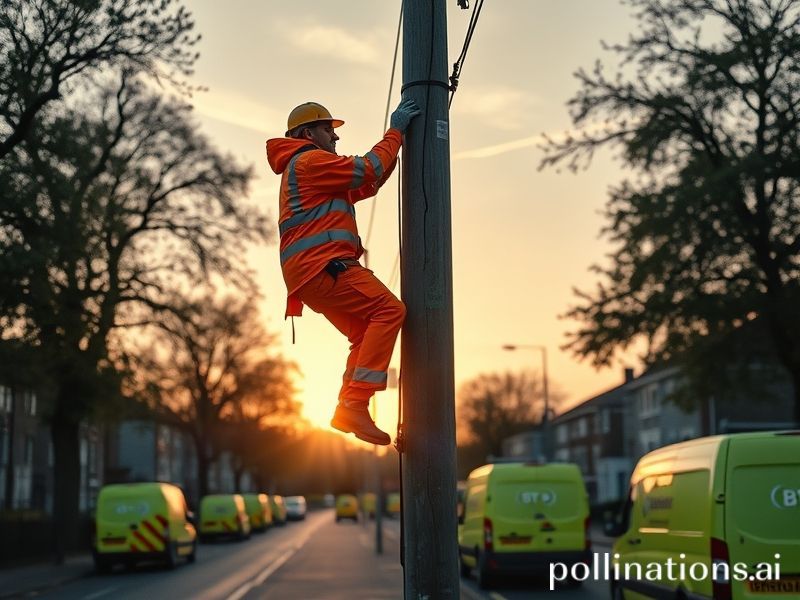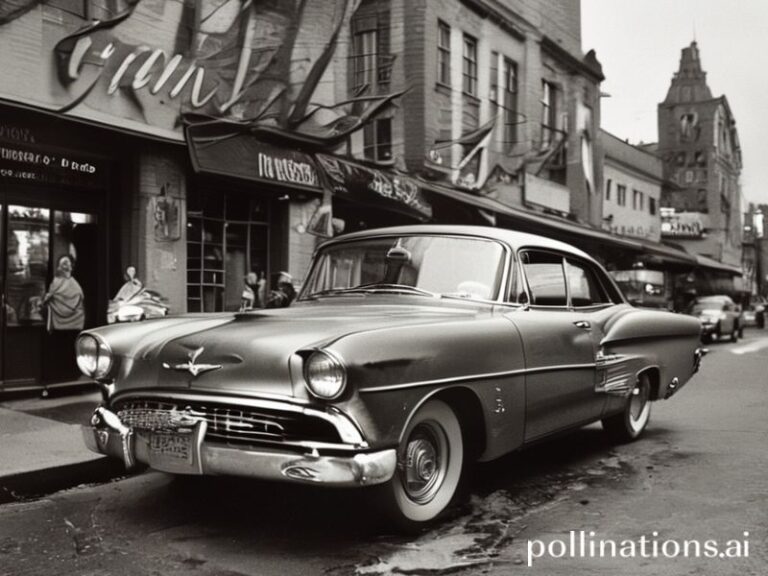Openreach: How a Quiet British Utility Quietly Runs the World’s Internet Hopes
The Empire of Copper: Why the World Still Cares About a British Utility Called Openreach
By Our Correspondent, somewhere with worse broadband than Leeds
It is a truth universally acknowledged that a single nation in possession of a creaking Victorian legacy must be in want of faster cat videos. Enter Openreach—the polite British euphemism for “the part of BT we pretend isn’t BT so regulators can sleep at night.” While the name sounds like a yoga pose for introverts, the company actually owns the ducts, poles, and existential dread that carry 95 % of the UK’s digital traffic. Globally, this matters for the same reason a sneeze on the London Underground rattles the FTSE: what starts in Slough rarely stays in Slough.
From Lagos to Lima, policymakers watch Openreach the way gamblers eye a roulette wheel. If the UK can force its former telecom monopoly to share its ducts at regulated prices, maybe—just maybe—Mexico’s América Móvil or India’s BSNL can be similarly tamed without bloodshed. The model is seductive: keep the infrastructure in one set of hands, but make those hands open the lid like a reluctant maître d’ at a soup kitchen. The EU took notes and cloned the idea with “Open Fiber” in Italy; Australia… well, Australia built the NBN, proving that even the best recipe can turn into a pavlova dropped on a barbie.
Meanwhile, the United States, bastion of free-market theology, looks on with the puzzled envy of a vegan at a Texas steakhouse. Americans spend their evenings begging Comcast—an organization that views customer service as an avant-garde art installation—for the privilege of paying $120 to buffer an episode of “The Crown.” They gaze across the Atlantic and see British villagers receiving subsidised fibre laid by Openreach engineers who, legend has it, apologize to the pavement before drilling. The spectacle is so moving that some US cities have started mulling their own Openreach-ish munici-fiber projects, funded by bonds nobody intends to repay and managed by mayors who still use Hotmail.
In geopolitical terms, Openreach is a pint-size case study in how to keep China from owning your entire digital nervous system. Huawei once offered to build Britain’s 5G kit at mate’s-rates; Whitehall responded by politely handing Openreach a shopping list labelled “Not Made in Shenzhen.” The result is a spaghetti western of vendors—Nokia, Ericsson, and a plucky start-up from Cheltenham that claims its routers run on moral superiority—competing for space on British poles. Emerging markets from Nairobi to Jakarta take careful notes: if even the birthplace of James Bond can’t trust Beijing, neither can they.
Of course, the cynic’s view is that Openreach merely swaps one monopoly for a slightly apologetic one. Engineers still turn up “between 8 a.m. and the heat death of the universe,” and rural customers can recite the company’s fibre rollout map by heart—mostly because it’s unchanged since 2018. Yet Wall Street analysts adore the firm: predictable cash flows, government lobbying budgets hidden under “consultant fees,” and a regulator, Ofcom, whose threats carry all the menace of a damp scone. In a world where tech giants can vaporise $40 billion of market cap by misplacing an earnings comma, Openreach’s glacial reliability is practically pornographic.
The broader significance? We are witnessing the late-capitalist equivalent of turning the Roman roads into a public–private partnership. Data is the new wheat, and whoever owns the furrows controls the harvest. If Openreach can shepherd Britain from copper to fibre without triggering a peasants’ revolt—or worse, an episode of “Question Time”—then every other country with legacy wires will treat the experiment like a clinical trial. Success means fibre for all; failure means 5G beamed from Alphabet balloons drifting ominously overhead like surveillance jellyfish.
So next time you see a fluorescent-jacketed engineer hunched over a pavement box, remember: he is not merely splicing fibre; he is stitching together the empire 2.0, one polite apology at a time. And should the entire project collapse under the weight of its own bureaucracy, at least we’ll still have the jokes—buffering slowly, of course.







